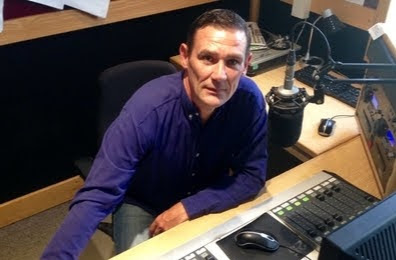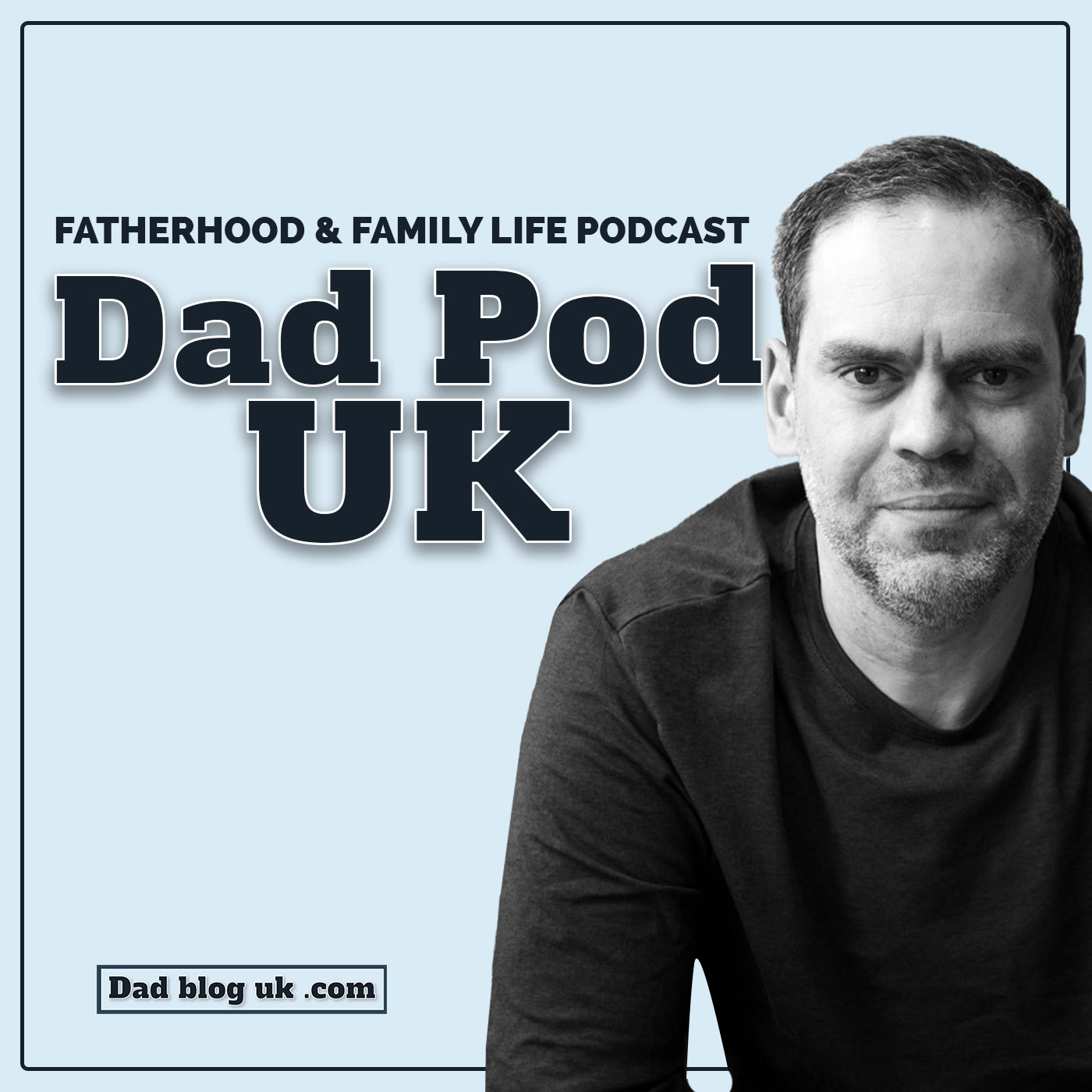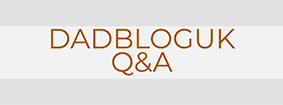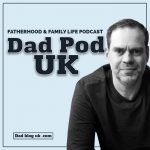A few years ago, I had a minor role with a charity project focused on men’s mental health. The project was seeking to help men in a variety of different situations. One of the groups it was looking to help was men serving prison sentences. This left me curious to know what it’s like being separated from your family and children because you are serving time. What impact could this have on family life? I decided to speak to someone who has first hand knowledge of the prison system and after a lot of searching, stumbled across dad, granddad and criminal justice campaigner David Breakspear.

As David explains in the interview below, his experience is quite typical for a prison inmate. He was a victim of abuse and started getting in trouble at school, leading to spells in young offenders’ institutions and eventually prison. He missed various milestone moments in his children’s lives because he was behind bars. There was also a prolonged period of estrangement from the children he had with his first wife.
He eventually hit rock bottom, taking drugs and sleeping rough in a church doorway. It was at this point he took a bizarre decision: He committed a robbery with the aim of getting sent back to prison. His plan was to go back to an environment he was used to, straighten himself out, make the most of the educational opportunities available to inmates and re-establish contact with his family.
It was a high-stakes gamble, but in David’s case it worked and he was released in 2017, a reformed man with a big interest in education and a desire to steer others away from the path he had followed. He’s also back in touch with his family and has just been awarded an MA in youth justice. He’s also a passionate campaigner for reform of the criminal justice system.
The interview below is an abridged version of my podcast interview with David. You can listen to the whole interview by clicking on the DadPodUK badge below. I hope you’ll agree David gives a fascinating insight into the prison system and its impact on those with families.
I begin by asking David about his journey to prison. He was very forthright and explained, like many with his background, that he was a victim of abuse:
“I’d been experiencing a period of sexual abuse from a stranger. A couple of years after that, I contracted meningitis and got my first caution at the age of 10. You can quite easily look at those two negative situations, I suppose, and what they call adverse childhood experiences. If you like, that was the catalyst for the next 40 years.”
Asked if meningitis left him with injuries that might explain his criminal behaviour. David says he “doesn’t know” but an aunt who was a senior registered nurse said it was a “turning point” in his life.
“When you experience the kind of life that I have, you bump into a lot of people that you find have very similar backgrounds growing up, especially within the criminal justice system. There’s quite a lot that share the same experience of childhood. And that’s why they end up in the criminal justice system. Whether there was any, I suppose physical damage, I don’t know.
“I blamed myself for allowing myself to be abused, and felt that the meningitis was my reward, my punishment, whatever way you want to look at it for allowing that to happen to me.”
It’s fascinating you say you the meningitis was a punishment for the sexual abuse you suffered as a boy.
“We’re going back to like to the early to mid-70s and there were only two forms of mental health back then: You were either sane or insane. No one spoke about anything. We didn’t have therapists. No one spoke about mental health. And therefore no one spoke about anything bad that happened to them, even the bad stuff you used to keep to yourself.”
We go on to talk about David’s family. I was curious to find out if he came from a known criminal family. David makes clear this wasn’t the case at all.
It turns out he was the youngest of six children. He found primary school hard because he was always compared to his older siblings and as a result he was, to use his own word, “naughty.”
His secondary school was in the centre of a rough estate and it was widely recognised as a bad school. David played up and started getting into trouble. A couple of David’s cousins were also at the school. He said they were also “naughty,” and it wasn’t long before he found himself being compared to them. After years of being overshadowed by older siblings, he said he learned how to be noticed by being “bad” and this gave him an identity.
“With hindsight, I can see quite clearly what it was that happened and where it went wrong. Who knows what other path I could have taken, whether I’d still have ended up where I ended up.
“I suppose it makes it easier for me to understand youngsters now, especially with my criminal justice experience. Not all bad behavior is because someone’s bad. Bad behavior could be another way to express feelings and emotions. And let’s be honest, no children are born bad. No children are born evil. There’s something that happens throughout their childhood that obviously makes them switch.
Before we get on to your other prison experiences, can you just explain what your family situation is and how many kids do you have got?
“Yeah, I’ve got three children now. I’ve got a daughter who’s 29, I’ve a son who’s 23, and another son who’s just turned 18. I’ve got two granddaughters as well, one who’s nine, and one who’s going to be three.”
Just to get a feel for how long you have actually spent in prison and the crimes that you were found guilty of, could you just sort of go through a couple of the sentences and the types of things that you have spent time in prison for?
David’s response wasn’t straightforward. He took me on a tour of young offenders’ institutions, care homes and prisons as geographically diverse as Kent and Cleveland.
“I went through a stage at one point where I was 15, 1985, I was in a children’s home in Cleveland. I was put into the care of the local authority. I was also facing charges as well. One was a serious assault on a youth club worker and I ended up getting four months detention center.
“My prison life very much reflects what a school life would be. I had my infant school, which was, if you like children’s home and detention center, which was infant school; then I had youth custody, which is junior school, and then I had big men’s prison, which was secondary school.
“From the kind of back end of the 80s, they put me on a tour of all the South youth custody centers, Rochester, Dover, I was also in HMP Canterbury (at the age of 17) when that was a man’s prison.”
After “four or five” years of being in and out of prison, David said he “really did” sort himself out. He got married and had a mortgage. After several years, it all went wrong again.
“From 2004 to 2015, I hardly spent any time out of prison, there’re little gaps in between. I was institutionalised. I was stubborn. I thought I knew best. For me, prison become quite a positive, happy environment. It became my comfort zone, a safe place. And on the back of that, I become a better person in prison than I ever was in society, which may seem a bit strange.”
The issue I really wanted to ask you about it was how all these stretches in prison impacted on your children and family?
“I remember very well, my first marriage, I split and we had a daughter and that all went wrong. I didn’t see my daughter for a number of years. Ironically, or coincidentally, she came and found me when I was in prison (more about this in a moment).”
David then explains then when he returned to prison in 2004, he was serving a sentence in Pentonville. There were telephones in the prison, which was notable to David as he hadn’t been in a prison where prisoners had access to phones before. By this point he had two young children aged seven and two. David picks up the story.
“For me, phones were still a new thing in 2004. On Christmas Day, I phoned home and I spoke to my children. It was the first time ever on Christmas Day I spoke to my own children whilst I was serving a prison sentence. It broke my heart. I was on the phone for literally five minutes.
“I spoke to Taylor and that was fine, he’s seven. Reece was two and I’d been on remand for a few months as well. You know kids, their language is changing virtually every day.
“When I’m on the phone with him, I couldn’t understand a word he’s saying and his mum’s having to repeat things and tell me what it was that he had said. That really hurt. That really did break my heart, and I just said; ‘Look, I’ve got to go’ and I’ve got off the phone. I went and banged myself up for the rest of the day (prison slang, meaning David spent the day in his cell).”

I explain that just before recording this interview, I had been out with my children and my youngest daughter had cycled past me. It had occurred to me that David must have missed out on stereotypical dad moments like teaching his kids to ride bikes. David’s response is very honest.
“I have. Do you know what, you have that side of it and yet, on the other side of it, which I was probably responsible for, was my youngest.
“My youngest was like me. He was going down the wrong path. He was excluded from school, he had been excluded from pupil referral units and he really was coming to the end of the line. The next step would have been incarceration. So I got out of prison this time with the right frame of mind for a change, with a change of character, that I needed in order to reform myself.
“I was able to use my experiences to help him. It might have been me that put him in that position, but I was able to get him out of it, having meetings with social services and with educational therapy workers. I was able to express how the education system failed me and the path that I took. I suppose I had a bag full of case studies to argue their points.”
David expands on what happened. I’ll paraphrase, but David’s son was expelled from school but under David’s guidance and with support, was using a nearby gym which was a positive experience and influence. He was steadily re-admitted to a mainstream school and ultimately went on to college.
“We could argue the toss over whether or not it was my fault that he was going down that path. The fact that I had the experiences I had, I was able to get him off of that path.”
I ask David what it was like receiving visits from family in prison. He explains all the formalities and the differences between a social visit (where you sit opposite someone at a table “like you see on TV” to quote David) and a family visit, where you have more freedom to mingle with visitors and get down on the floor with any children.
I imagined he’d say they were a real highlight of prison life. His response surprises me.
“They really are not that enjoyable,” he said.
He explains for most inmates, there’s a big build up to a family visit. This can make it very stressful and also a painful reminder of what they’re missing out on.
“Seeing someone, just to hold someone even for five seconds, that for me is the thing that I used to miss most in prison. Holding hands, having a cuddle with your child, having your child fall asleep in your arms. Those are the things that you really do miss and family visits are the things that bring that back to the forefront of your mind every single time. Until the build up for a visit, you can kind of put it out of mind and get on with day-to-day prison life. But as soon as you got a visit booked, it’s all family, or whoever’s coming up to see you. So as much as visits are a positive, they were also negative in my mind.”
As mentioned at the start, this is an abridged version of our discussion. David and I discussed many other issues, such as re-adjusting to family life after being released and whether the Ministry of Justice does enough to support families and inmates with families (most support seemingly coming from charities). I do recommend listening to the full interview as we cover so much more in the podcast episode.
I will finish off on a positive note as David tells the story of how he discovered he was a grandfather. Before getting on to that, a quick note of explanation. David and his daughter had been estranged for some time. As luck would have it, they both started making attempts to re-establish contact at the same time as David served his last sentence.
“One of the reasons why I went back inside was to build up relationships again with my children. I’d had adhoc contact, and it was quite negative contact.
“I wanted to use that time away, not only to sort myself out, but also to give me a base where I could easily get in contact and stay in contact without, I suppose, any other temptations that you get out in society. It took me a while.
“After 15 months of receiving letters, and convincing them (David’s daughter and son) that this time really is different, they got in contact. To be honest, it’s been a case of not looking back. I mean, we’re not in each other’s pockets, and they’ve got their own lives. It’s nice that we’ve got the relationship and that it was what I envisaged when I was in prison.
“There’s a facility that’s been around a while now. It’s called Email a Prisoner. When an email gets sent, the prison, depending on staffing levels, will print all emails off at specific time. You can imagine from when they closed for the day previously, to when the emails get printed off, you can get a whole story.
“So my daughter was giving birth through the night to my youngest granddaughter and she was emailing me! So I’ve got a set of emails with my daughter starting off going, ‘Oh, I’m off to the hospital’….’I’m in labour’…all the way through the night! I think it was about six or seven different pages. By the time I got the emails the next morning, she was born, and I had the whole story. In a way, I’ve got such a connection to my youngest granddaughter.”
To find out more about David, his life and work as a criminal justice campaigner and to see his TEDx speech, visit his website and blog (Journey of a Reformed man).
David has also been involved with a charity called Storybook Dads where prison inmates are recorded reading books for children on CD or DVD. You can find out more about the charity here.







